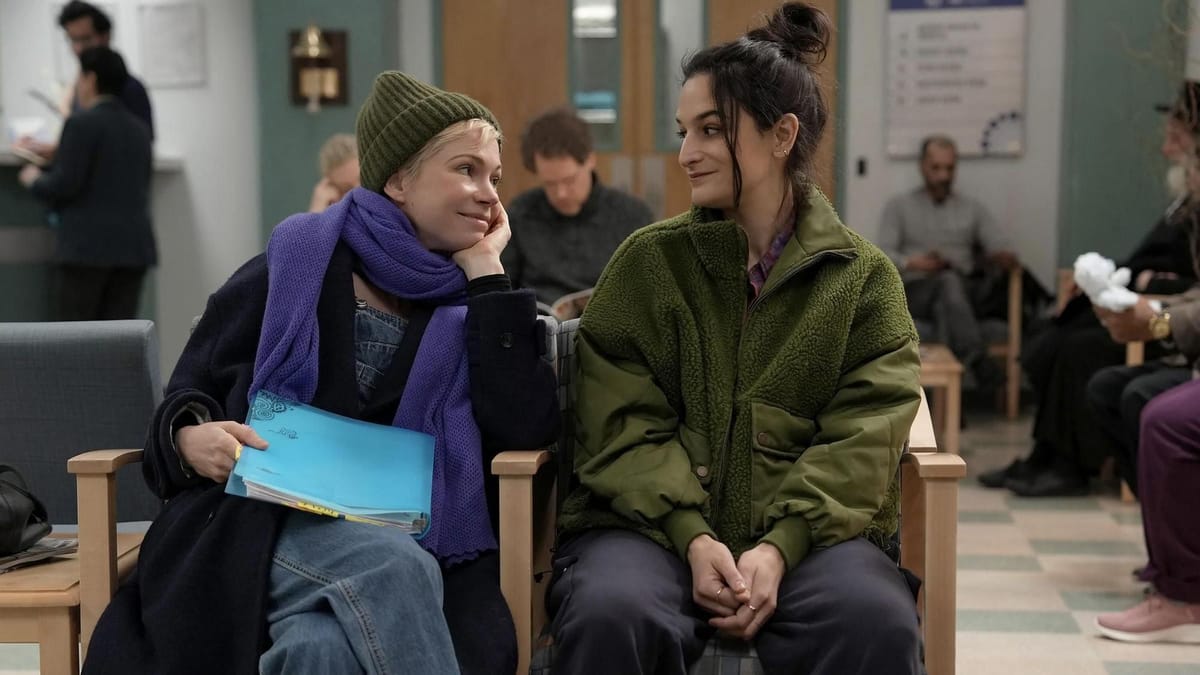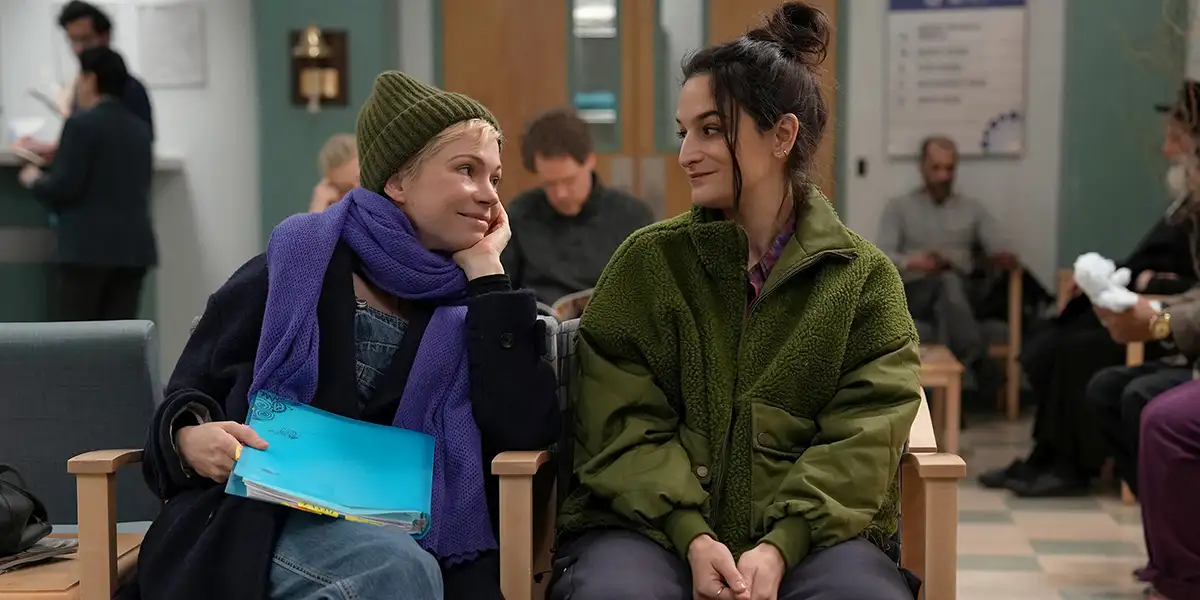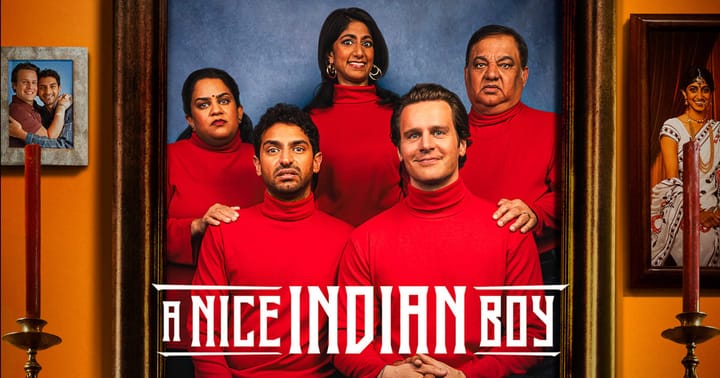Dying for Sex is about who we choose to die with
Pain and pleasure in Dying for Sex (2025)

"Death is not a mystery. It's not a medical disaster. It's a bodily process, like giving birth, or like going to the bathroom, or coughing, having an orgasm." (Dying for Sex, 2025)
When Molly Kochan finds out that she has Stage IV breast cancer, she separates from her husband to pursue a bucket list wish: having an orgasm with another person.
Dying for Sex is a 2025 miniseries loosely based on a podcast of the same name, in which real-life Molly and her best friend, Nikki, tell the story of Molly's decision to leave her marriage and begin an unashamed exploration of her sexual desires. In the show, Molly and Nikki are played by Michelle Williams and Jenny Slate respectively. The pair shares such an extraordinary chemistry that makes it difficult to believe they hadn't interacted before their chemistry read for the show.
Although Dying for Sex is described as a story about Molly's sexual escapades, this is more so a story about platonic romance and personal freedoms. But before getting into the show, I want to take you back to around the 17th century when English writer John Donne wrote a poem called The Flea. (Bear with me now.)
The Flea is described as an erotic metaphysical poem and was first published posthumously in 1633. As was characteristic of metaphysical poems, The Flea relies on an extended metaphor — or conceit — to tell its story. In Donne's poem, a speaker uses a flea, which has sucked blood from both himself and his lover, to convince his lover to sleep with him. He argues that since their bodily fluids are already mingling inside the flea, sex would be no different and no less innocent: "This flea is you and I, and this / Our marriage bed, and marriage temple".
When the flea eventually dies by the lover's hand, the speaker's offended that she would dare kill a creature whose only guilt was the drop of blood it sucked from her. With the sexual innuendos throughout the poem and the flea's death at the end, Donne entangles imagery of death and sexual pleasure. He also creates a coexistence of the themes carpe diem (seize the day) and memento mori (remember that you have to die).
Some understandings of The Flea even liken the flea's death to la petite mort (the little death) — a euphemistic phrase for an orgasm.

Like in The Flea, Dying for Sex finds parallels between Molly's journey in taking charge of her body as it's dying and what she learns about her sexual desires.
When she realises that she craves a domineering role in sexual encounters, she's taught that it isn't just about possessing physical power. Being a top is also about understanding the nature of subservience while holding the mental clarity and presence needed to be in control of another person.
Molly's development in expressing what she wants from another person is directly reflected in how she navigates her experiences as a cancer patient. She asks her doctor to hold her hand while talking to her, breaking down the impersonal barrier between them and initiating a more humanising space. Eventually, in the penultimate and final episodes, Molly's sex life and life as a person with terminal cancer come together in the show's very own depiction of "the little death".
The long-awaited moment of Molly experiencing an orgasm with another person for the first time is not the physical-centric setup you might expect from on-screen intimacy. Instead, it's a composition that's only concerned with Molly's face, the scene punctuated by her sharp breaths. This sensation belongs to her alone. But although it's this character's climactic (excuse the pun) event, a tugging awareness returns of what must come next. Memento mori. Remember that you have to die.
When Molly is moved to hospice, her care worker prepares her for what she'll expect while her body dies. "And when you are very close to death," she explains, "your breathing goes into a cycle of deep, slow breaths and long pauses. And then, eventually, there's a breath out that is not followed by a breath in." In this dialogue, Dying for Sex calls back to the previous episode's sex scene of Molly's metaphorical little death. But, significantly, when Molly finally experiences her body's literal death, it's both her and her best friend's full bodies in frame.

"I don't want to die with him. I want to die with you," Molly confesses to her best friend, Nikki, in a pivotal reclamation of her body.
Dying for Sex speaks to the multifaceted nature of having power and autonomy over one's own body, whether it be in sex or death. When Molly's husband dismisses her increased libido as a side effect of medication, Molly asserts her ownership over her body. "It's my life. It's my death. It's mine," she says. And its this downward spiral of their marriage that leads to the decision that would shape the end of her life: choosing who she wants to die with.
"I wanna feel everything for as long as I can." (Dying for Sex, 2025)
When a story revolves around cancer, it's easy to already have in mind a character whose journey is driven by physical suffering and emotional distress. But Dying for Sex brings something different. It brings pleasure and a sense of humour that will have you laughing through tears.
My only gripe with the show is its dependence on voice-over narration. Although I'm not certain what inspired the decision, it is common for screen adaptations to cling to the source material's original text through voice-over, detracting from the natural ability of film and television to tell a story visually. Michelle Williams, who I sincerely believe invented the art of acting, is a performer whose face implies everything you need to know about her characters' internal worlds, so explicit narration of Molly's thoughts comes across as redundant.
Other than that, Dying for Sex is a brilliant miniseries that refuses to reduce its protagonist to a tragedy. In the face of being shamed for her choices, Molly persists in her pursuit of pleasure with the relentless, albeit chaotic, support of her soulmate — her best friend.





Comments ()